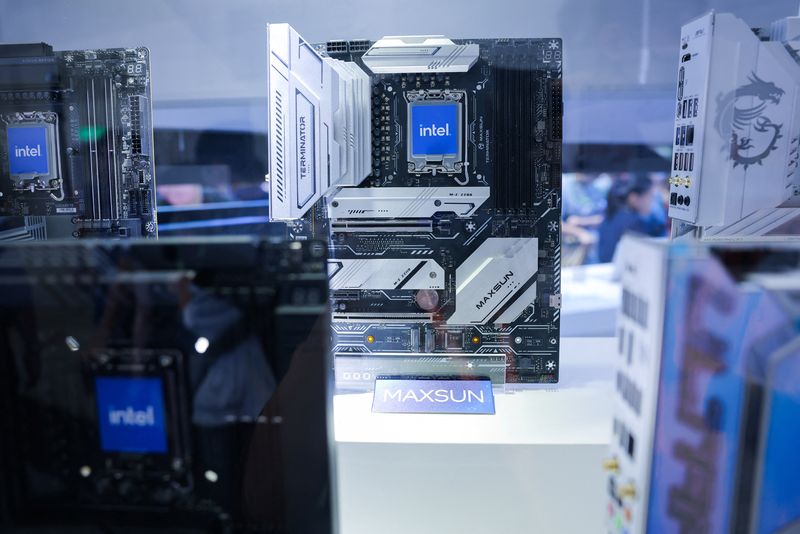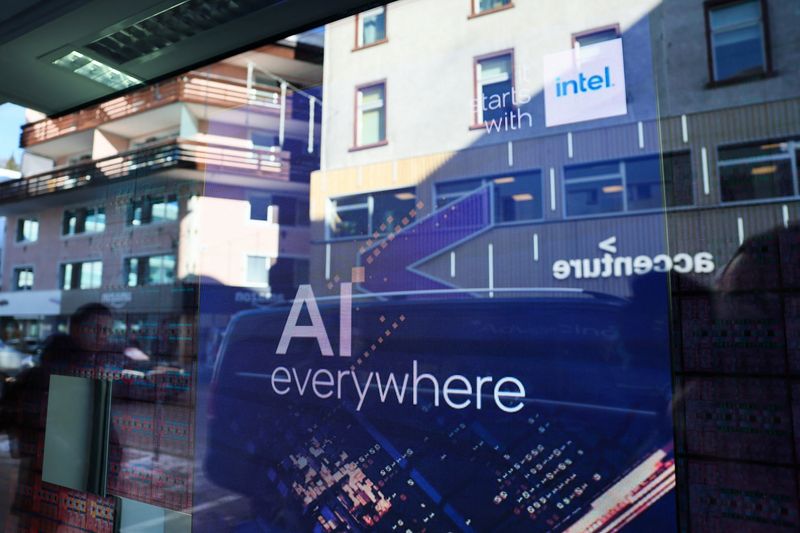By Jeffrey Dastin
(Reuters) -Intel's upbeat revenue projections on Thursday masked a sore point for the embattled company: chips touted for artificial intelligence have not lived up to sales expectations.
The chipmaker scrapped its recent forecast that in 2024 it would sell more than $500 million worth of Gaudi accelerator chips, so called because they speed up the performance of AI applications.
In a call with analysts, CEO Pat Gelsinger attributed their slower uptake to software related to Gaudi and a recent transition from the second to third generation of the chip.
While the upbeat total revenue forecast pushed up Intel (NASDAQ:INTC) shares by about 5% in early trading on Friday, its stock remains more than 50% lower for the year as the chipmaker misses out on the AI boom and struggles with a turnaround.
The Gaudi disappointment underscores Intel's persistent AI travails, years after it declined to pick one strategy that could counter its skyrocketing rival Nvidia (NASDAQ:NVDA). It also shows challenges Intel has faced in delivering on a promise to investors.
After the late 2022 launch of viral ChatGPT, powered by Nvidia GPUs, Gelsinger hoped Intel's AI chips could win new business.
When teams at Intel predicted they could sell at most $500 million, Gelsinger told his executives the figure was not high enough, according to a Reuters special report published Tuesday.
Intel had to project at least $1 billion when Nvidia's comparable sales were much higher, a source cited Gelsinger as saying. The company did so: in July 2023, Gelsinger touted a more than $1 billion "pipeline of opportunities" led by Gaudi.
Intel at the time had not secured enough supply from the contract chipmaker TSMC to meet the target, two sources told Reuters.
In an earlier statement, Intel said Gelsinger's comments reflected prospective deals accurately.
"No company converts 100% of its pipeline into revenue," Intel said. "We make no apologies for setting ambitious internal targets for our teams – and we will always try to exceed the goals we set for ourselves."
By January this year, Intel told investors more than $2 billion in AI-chip deals were possible. In April, Gelsinger said he expected over $500 million in such AI revenue in 2024. On Thursday, he said he scrapped the forecast.
"Taking a longer-term view, we remain encouraged by the market available to us," Gelsinger said.
Analysts did not mince words.
Vivek Arya of Bank of America asked Gelsinger what business looked like for Intel if its CPU chips, or central processing units, became commoditized and "if there is no competitive AI product?"
"What is Intel's AI strategy right now?" Arya asked.
Gelsinger said CPUs are playing an increasing role in data centers for AI, and customers were showing "good early interest" in Gaudi. Benchmarks for the chip's third generation were impressive, he said.
Overall, Intel reported third-quarter revenue of $13.3 billion, exceeding analysts' estimates. It posted a $16.6 billion loss attributable to the company, after impairment and restructuring charges.
For Michael Ashley Schulman, chief investment officer of Running Point Capital, Intel's cost-cutting and high-growth focus showed it could rebound.

But he had doubts.
"The concern is that Pat Gelsinger may be exaggerating prospects and progress," Schulman said. Intel's CEO, he said, "may not have as tight of control on operational levers and customer fidelity as he needs."
